Open Monograph Award Expands Access to Duke Faculty Research
A lavishly illustrated new book about the evolution of Japanese graphic design in advertising is the latest recipient of the Duke Open Monograph Award, funded by the Duke University Libraries to facilitate greater access to Duke faculty scholarship through open access publishing.
 In The Fine Art of Persuasion: Corporate Advertising Design, Nation, and Empire in Modern Japan (Duke University Press, 2025), Gennifer Weisenfeld, the Walter H. Annenberg Distinguished Professor of Art and Art History at Duke, tells the story of how modern corporations and consumer capitalism transformed Japan’s visual culture from the early 1900s through the 1964 Tokyo Olympics, a pivotal design event that rebranded Japan on the world stage.
In The Fine Art of Persuasion: Corporate Advertising Design, Nation, and Empire in Modern Japan (Duke University Press, 2025), Gennifer Weisenfeld, the Walter H. Annenberg Distinguished Professor of Art and Art History at Duke, tells the story of how modern corporations and consumer capitalism transformed Japan’s visual culture from the early 1900s through the 1964 Tokyo Olympics, a pivotal design event that rebranded Japan on the world stage.
In April, the Libraries hosted a talk with Professor Weisenfeld to celebrate the launch of the book, which is available as a physical
monograph but also as a free open access ebook.
Many academic monographs in the humanities and social sciences see limited distribution—a print run of only a few hundred copies, and electronic access (if any) locked behind a paywall. The Duke Open Monograph Award aims to flip that traditional publishing model by providing $15,000 per book—paid to a participating university press on the author’s behalf—to make a digital copy freely available online under a Creative Commons license.
“Academic books tend to be expensive, especially books in art history that have higher production value with extensive illustrations,” said Weisenfeld about the experience of publishing her book open access. “This can become a cost barrier for access. I know [this support] will propel the book forward to reach a much broader audience over the course of its lifetime. This means a lot to me and will definitely increase the impact of my scholarship among a national and global readership, particularly students.”
We’ve Got News for Duke
Here’s a headline number for you: 9,886.
That’s how many Duke students and employees have signed up for a free all-access subscription to the New York Times online, courtesy of the Duke Libraries, since we began offering the service at the start of this year.
The Libraries’ all-access subscription is only available to current Duke students, faculty, and staff (NetID required) and includes everything the site offers—including Games (Wordle, Spelling Bee and Crossword), Cooking, Wirecutter, The Athletic, and more than twenty subscriber newsletters.
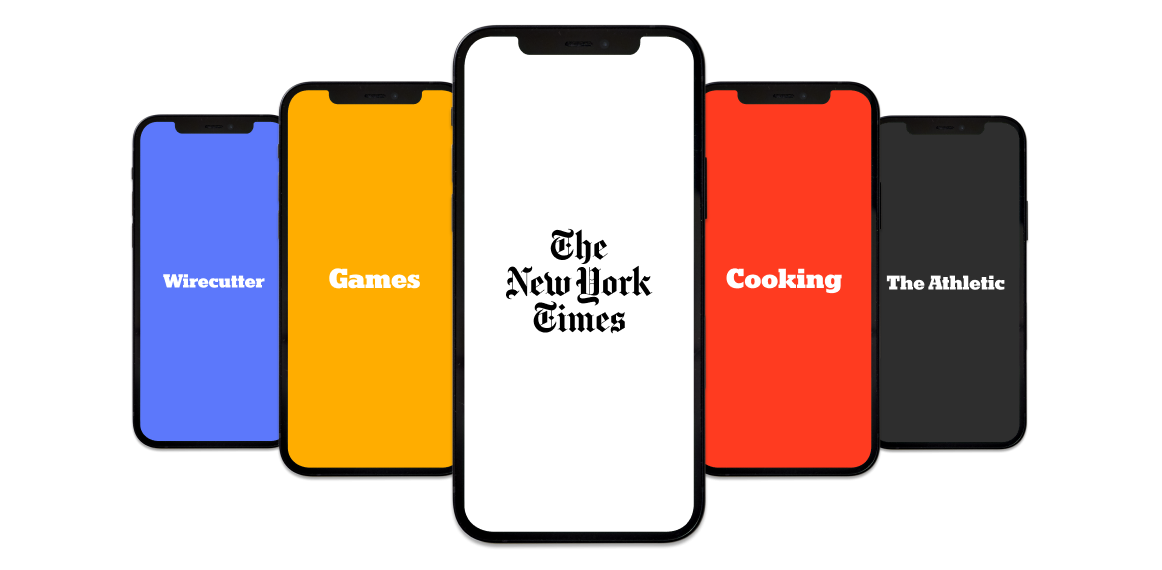
The service has been particularly popular with students, who appreciate the personal financial savings as well as the in-depth reporting. Initial usage stats show that, for the spring 2025 semester alone, Duke users viewed some 599,137 articles, 64,632 Cooking recipes, 17,498 Wirecutter reviews, and played 427,337 games.
At the same time, we also introduced free access to the Atlantic online this year, including all the latest articles, the Atlantic Archive, podcasts, the crossword, and more. We regularly receive requests for the Atlantic for personal and classroom use and are pleased to make it available to the Duke community. The magazine has a long, distinguished history as a cultural reporter and opinion-maker since its start in 1857. Since we rolled out the new Atlantic access, some 2,448 Duke users have taken advantage of it.
“The library is here to provide people access to information, and this is a great way to be able to provide that,” said Arianne Hartsell-Gundy, Librarian for Literature, who has helped to promote the new all-access subscriptions to Duke students and faculty. “We’re also thrilled to be able to give people more opportunities to read and have access to different viewpoints.”
Book on Cross-Border Gun Trafficking Wins Méndez Award
A new book about how American firearms drive violence in Mexico is this year’s winner of the Juan E. Méndez Book Award for Human Rights in Latin America. The Rubenstein Library’s Human Rights Archive is a co-sponsor of the award.
 In the book, anthropologist Ieva Jusionyte follows the illicit trade in firearms that circulate between the U.S. and Mexico. Drawing on the author’s experience as a former paramedic who treated victims of gun violence, Exit Wounds: How America’s Guns Fuel Violence Across the Border (University of California Press, 2024) is both a cultural history of guns and an analysis of the politics and economics that perpetuate a vicious circle of violence.
In the book, anthropologist Ieva Jusionyte follows the illicit trade in firearms that circulate between the U.S. and Mexico. Drawing on the author’s experience as a former paramedic who treated victims of gun violence, Exit Wounds: How America’s Guns Fuel Violence Across the Border (University of California Press, 2024) is both a cultural history of guns and an analysis of the politics and economics that perpetuate a vicious circle of violence.
Jusionyte visited Duke in March to accept the award and talk about the book. “I wrote Exit Wounds because I wanted to draw attention to how our guns are implicated in human rights violations in Mexico and beyond,” Jusionyte said. “I hope that the book will make us realize that migrants and refugees who seek safety on this side of the border do so because they are fleeing threats enforced with weapons that come from the United States. Especially in these times, when anti-immigrant rhetoric and calls for border walls are getting louder again, we need to accept our responsibility for the mess we have caused abroad by caring more about guns than about people they wound.”
First awarded in 2008, the Méndez Human Rights Book Award honors the best current nonfiction book published in English on human rights, democracy, and social justice in contemporary Latin America. The books are evaluated by a panel of expert judges drawn from academia, journalism, human rights, and public policy circles.
Bringing History’s Female Philosophers to the Forefront
Here’s a question: Who is the most famous female philosopher you can think of?
Can you think of any? If you answered no, you’re not alone. For a long time, philosophy has had an image problem. The philosophical canon most of us are exposed to is dominated by dead white males.
That’s a real issue, especially if you’re a working philosopher today—someone who cares about the life of the mind and wants to show students how it’s relevant to their lives. Someone like Andrew Janiak, Professor of Philosophy at Duke.
A decade ago, Professor Janiak approached the Duke University Libraries with an idea. He wanted more women and under-represented voices being taught in philosophy classes. How else were students today supposed to see themselves in the material?
Janiak enlisted the help of library colleagues Liz Milewicz (Director of the ScholarWorks Center for Open Scholarship), Will Shaw (Digital Humanities Consultant), and Cheryl Thomas (Librarian for Philosophy and Religious Studies). Working together, they came up with a plan. They would build an open-source website to provide resources for philosophy teachers, spotlighting female philosophers whose historical contributions have either been buried over time or never properly recognized at all. It was called Project Vox, because it gave marginalized voices a place to be heard.
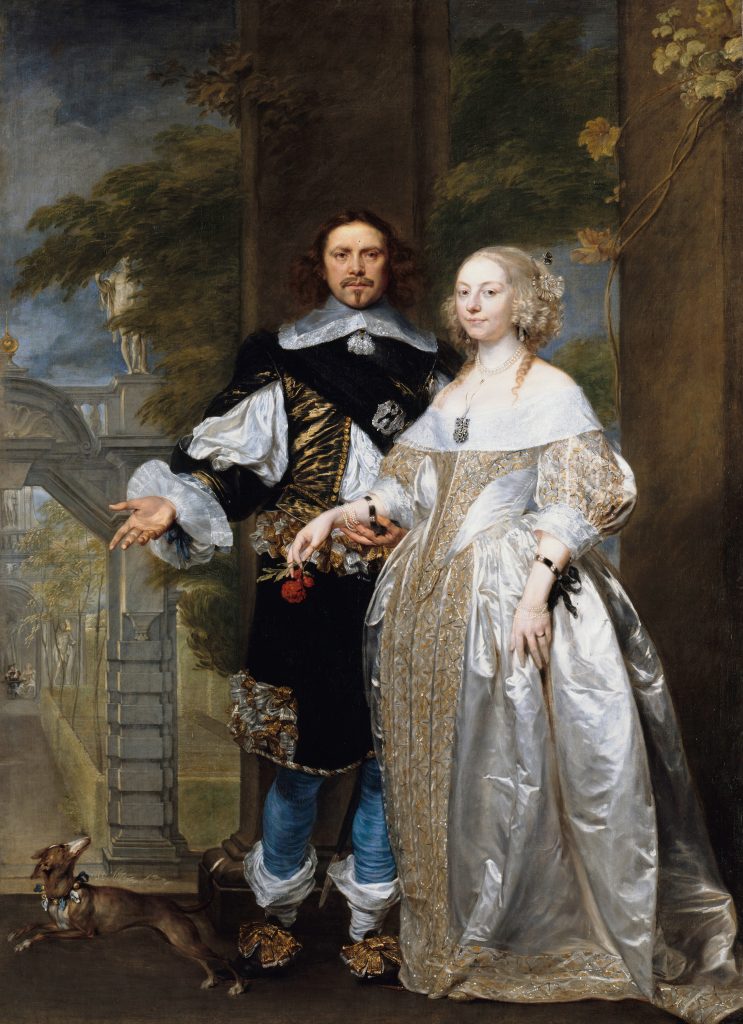
The strategy worked. For ten years now, Project Vox has provided a platform for students across Duke— in philosophy but also economics, political science, history, and the arts—to conduct and publish original research on the Project Vox website, an open-access resource that has fueled a renaissance among philosophy scholars around the world.
The site has recorded 300,000 page views from 180,000 unique users in 190 countries. More than 100 students, faculty, and researchers have been a part of its development, and it has been featured in such outlets as the Atlantic, Washington Post, and London Times. In the process, it has brought to light the work of female thinkers like Emilie Du Chatelet, Margaret Cavendish (pictured here) and Tullia d’Aragona. The site is hosted by the Duke University Libraries.
Project Vox celebrated its tenth anniversary in February with a free symposium in Bostock Library that drew scholars from around the country. The next challenge the Project Vox team hopes to tackle, according to Professor Janiak, is correcting inaccuracies about philosophers on Wikipedia, usually the first place people look for information on historical figures. For many female philosophers, Wikipedia’s info is often incorrect or incomplete.
“That portrayal of an historically neglected figure is crucial, and often misleading at best,” Janiak says. “That misleading information or bias can have a lasting impact. So we’re trying to help improve that.”
Congrats to Our Student Book Collectors!
For nearly seventy-five years, we’ve sponsored a book collecting contest to encourage Duke students to build their own personal libraries. Anyone may enter, and you don’t have to be a serious “collector” to win. Collections are judged on adherence to a unifying theme, not rarity or monetary value.
We are pleased to announce this year’s winners of the Andrew T. Nadell Prize for Book Collecting. In addition to cash prizes, all winners receive a Grolier Club book of their choice, a three-year membership in the Bibliographical Society of America, and a year’s membership in the Book Club of California.
Undergraduate Category
- 1ST PLACE: Phoebe Trask for “Bandes Dessinées from a French Childhood: A Colorful Window into French History, Politics, and Culture”
- 2ND PLACE: Sophia Cox for “The Natural World: The Line Between Science and Magic and Between the Known and the Unknown”
Graduate Category
- 1ST PLACE (TIE): Peter de Guzman for “What Is His Identity?: Building a Filipino American Library”
- 1ST PLACE (TIE): Merlin Ganzevoort for “From Parisian Gardens to Treasure Island: Nineteenth Century and Early Twentieth Century Travel and Adventure Literature”
- 2ND PLACE: Daniel Orr for “Greek and Latin Student Commentaries 1908–2021”
The Nadell Prize is named for Dr. Andrew T. Nadell M’74, who began collecting rare books when he was a student at Duke. He credits his interest in book collecting to two of his Duke mentors, G. S. T. Cavanagh (Professor of Medical Bibliography) and Gert Brieger (Professor of the History of Medicine).
Celebrating Asian American and Pacific Islander Connections at Duke
A new mural in Perkins Library celebrates the international diversity of Duke’s workforce, which is almost as diverse as the student body itself, drawn from nations and cultures around the world.
The mural—made up of more than 300 wooden blocks and measuring 4 feet by 6 feet—was created by the Duke Asian American and Pacific Islander (AAPI) Affinity Group and artist Brandon Johnson. It depicts the affinity group’s logo: a lotus flower and the Polynesian wave tattoo symbol to represent Asian and Pacific Island cultures.
The mural has been on exhibit at Duke University Hospitals since 2024 and will be on display on the second floor of Perkins Library for the next two years.
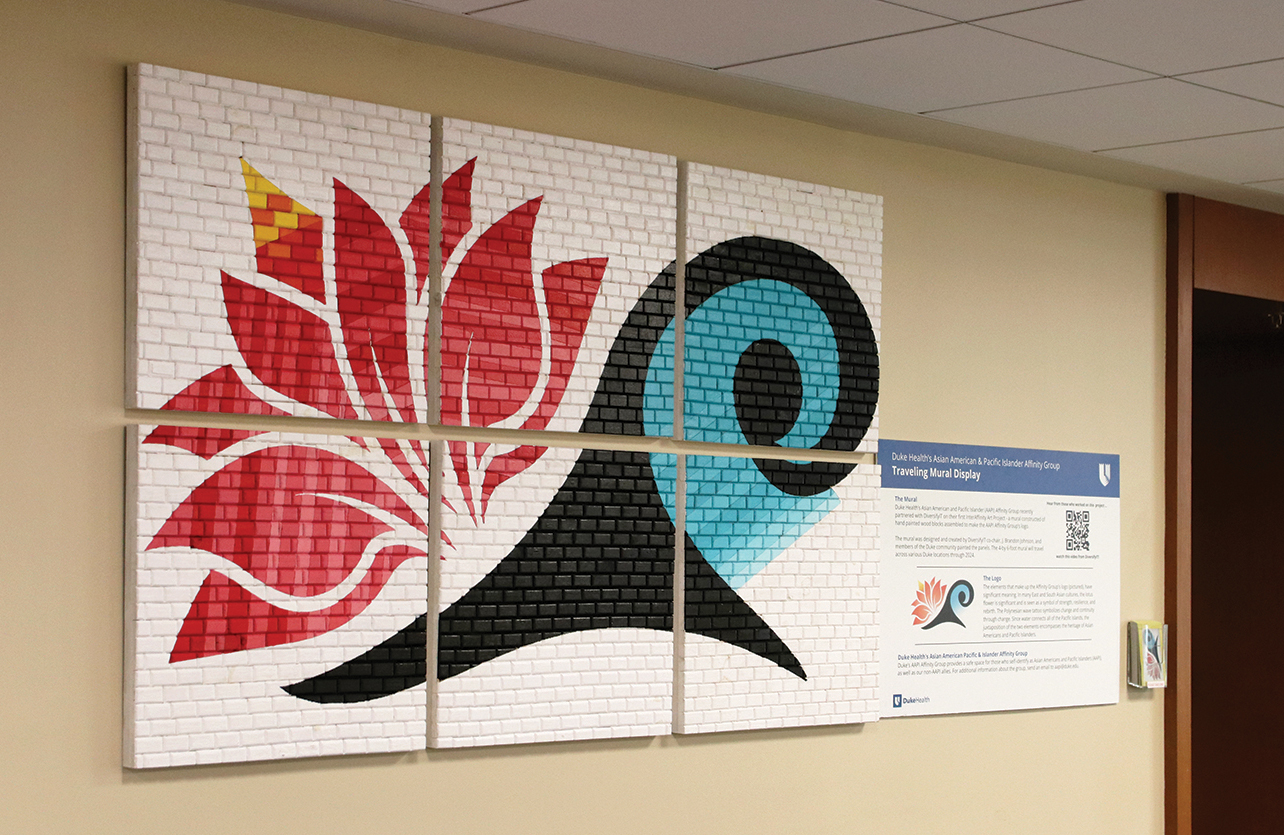
Duke Marine Lab Library to Close
First opened in 1976 and named in honor of the Duke Marine Lab’s founding director, the Pearse Memorial Library at the Duke Marine Lab is slated to close after nearly fifty years in operation, effective July 1, 2025.
The closure is part of a strategy to “align library services with research and teaching needs around climate and sustainability at Duke–a strategy that has sadly been accelerated by the expected financial impacts on the university of reduced federal research funding,” wrote University Librarian Joseph A. Salem, Jr., in a message explaining the decision to Marine Lab faculty, students, and staff.
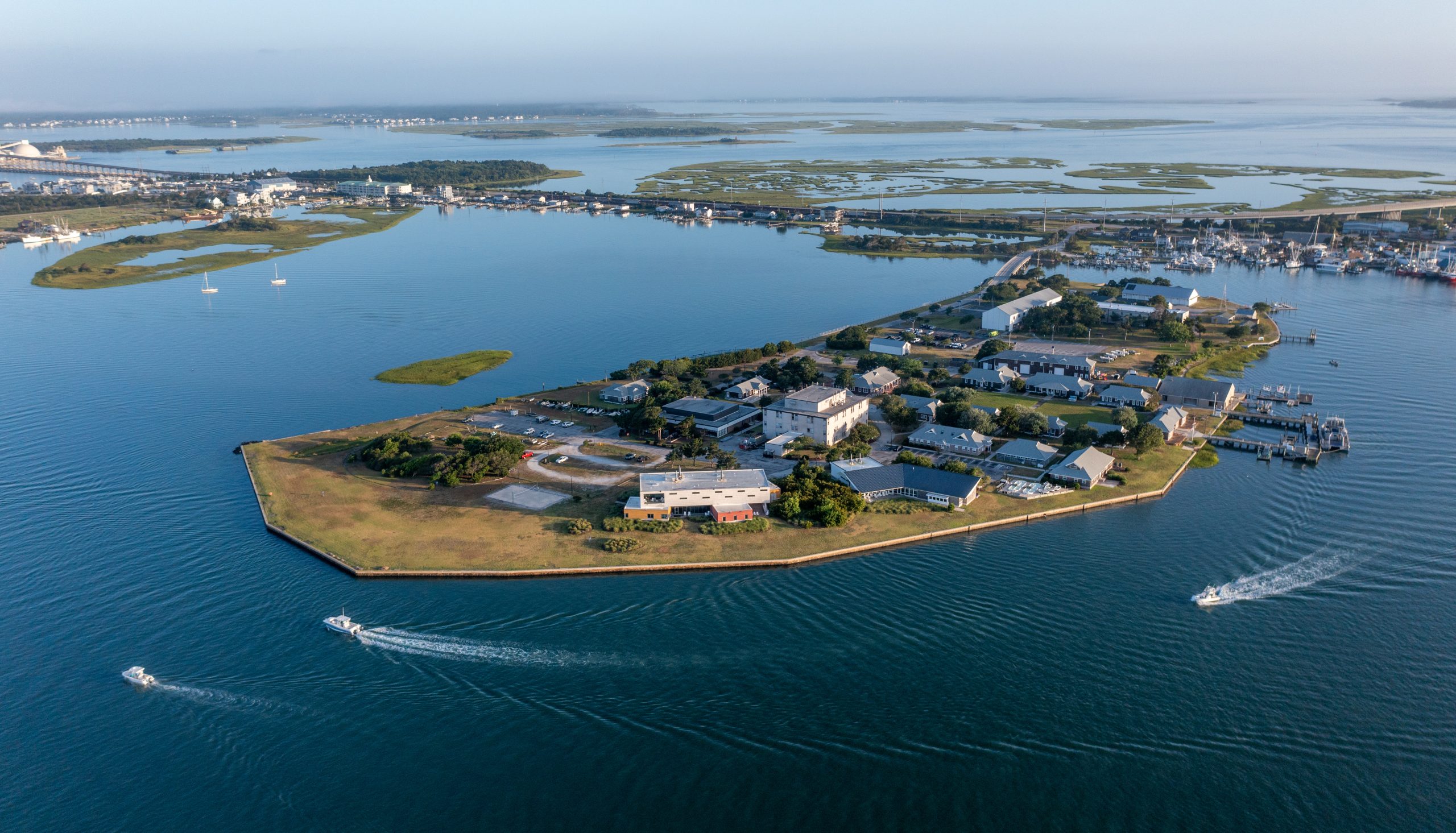
Although the physical library will close, there will be no interruption or reduction in the essential library services and resources the Marine Lab community relies on, including book delivery, research consultations, research instruction and workshops, and library outreach and engagement.
Jodi Psoter, Head of the Marine Lab Library and Librarian for Marine Sciences, will transition into a new role as Climate & Sustainability Strategist and Librarian for Marine Science and Conservation. Psoter will continue to live and work in Beaufort, North Carolina, and will regularly visit the Durham campus, focusing on supporting interdisciplinary teaching and research on climate and sustainability across the university.
Conversations were already underway between the Marine Lab and library leadership about the future of the space, as in-person usage has declined over time. While the closure was likely to happen eventually, this year’s unprecedented cutbacks in federal research support hastened the transition.
Nevertheless, the decision “enables us to advance the goals of the Duke Climate Commitment and Duke Libraries’ strategic plan, while at the same time realizing cost savings that are unfortunately necessary for the university,” said Salem.
Honoring Our All-Stars
Each year, we celebrate our extraordinary library staff with the DULies. Bigger than the Oscars, more nail-biting than the Final Four, the DULies recognize extraordinary job performance that far exceeds individual goals or expectations.
Pictured here are this year’s awardees, all of whom go above and beyond for the Duke University Libraries (left to right): Henry Hebert, Conservator for Special Collections, winner of the Mentoring Award; Antha Marshall, Serials Management Assistant Sr., winner of the Sara Seten Berghausen Equity & Inclusion Award; Erin Hammeke, Senior Conservator for Special Collections, winner of the Great Idea Award; and Erin Nettifee, IT Business Analyst, winner of the Florence Blakely Collaboration Award. Congratulations to them all!
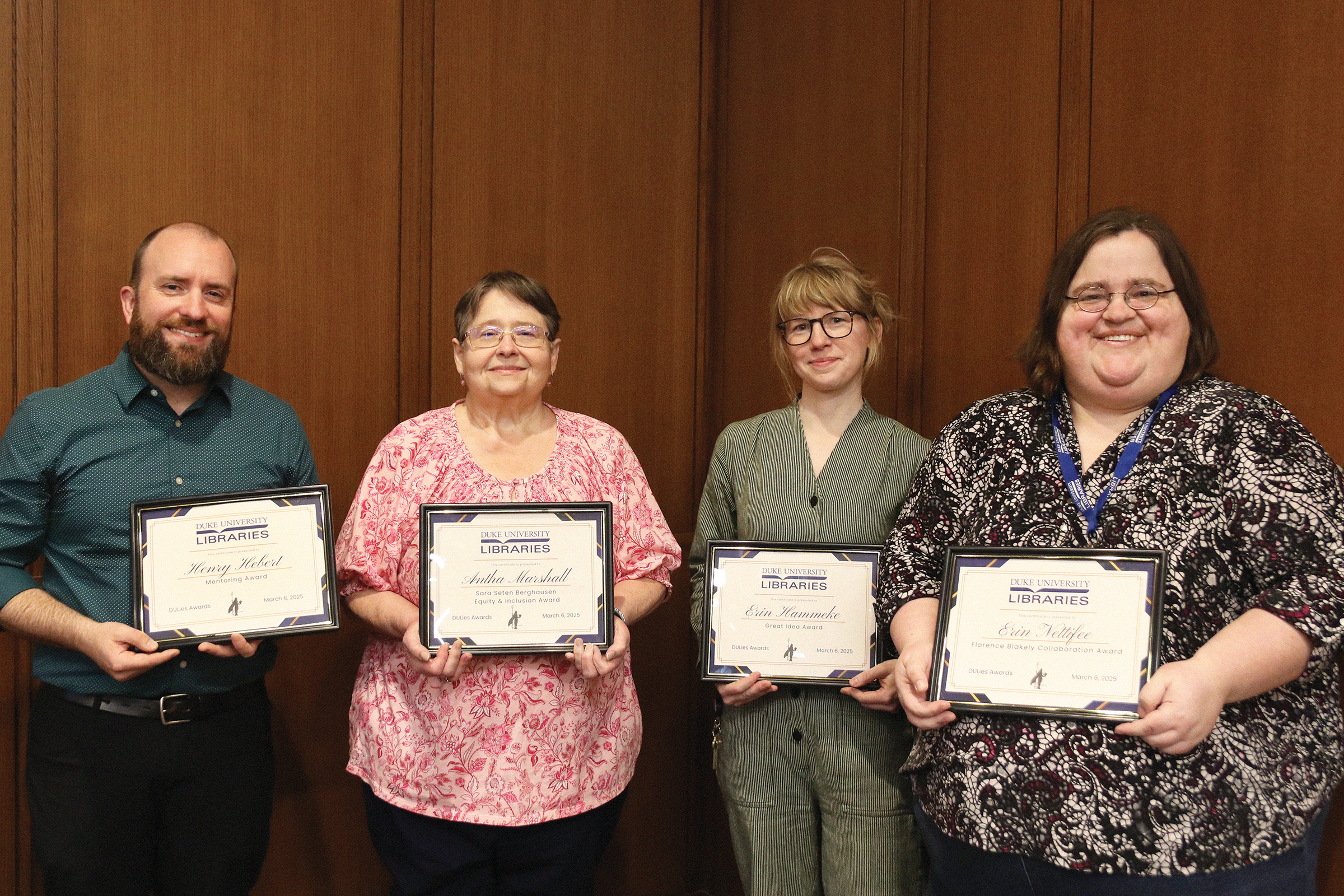
A Little Library 101 with the Littlest Blue Devil
Every year, the Association of Research Libraries hosts the ARLIES Film Festival, highlighting videos that promote the use of libraries, their spaces, services, collections, and expertise.
We’re proud to announce that our video How to Find a Book in the Stacks won the “Best How-To/Instructional Film” category this year!
The two-minute video follows along with the “Littlest Blue Devil” as he finds a book in our online catalog and uses the call number to track it down and check it out. That may seem like pretty basic library 101 stuff, but it’s one of the most frequently asked questions our librarians get from today’s Duke undergrads, many of whom are experts at online searching but aren’t as practiced at “old school” research skills like reading a Library of Congress call number.
The video has been viewed thousands of times across Instagram, Facebook, and YouTube and is being used in library orientation sessions. It’s a good reminder that even at top-ranked universities like Duke, students often need help getting up to speed on college-level research. That’s why they have friendly Duke librarians to help them find what they’re looking for.

